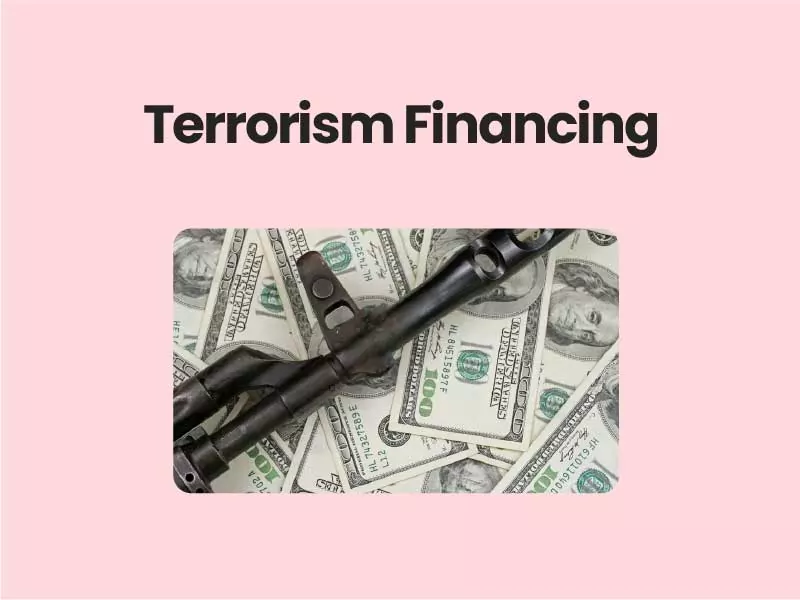
Terrorism Financing
For the last few decades, terrorism financing has been a prevalent financial crime on which authorities are desperate to the crackdown. A multitude of laws and regulations have been enacted to reign in the financing of terrorist activity, and are collectively known as counter-terrorist financing policy. Under these policies, most financial institutions are required to fulfil many strict requirements regarding monitoring customers’ transactions and behaviour, conducting proper due diligence, and maintaining appropriate records.
Funding mechanism
Terrorist organisations get and protect their funding through a variety of illicit activities: Terrorist organisations use sophisticated and dynamic money laundering techniques to conceal their financial assets and sources of funding in order to pass undetected through the global financial system, often making their illegally obtained funding appear as legitimate business activity.
How are funds used?
- Operations, including: terrorist attacks, pre-operational surveillance, travel to and from the target location, vehicles and other machinery, firearms, false identity documents and basic living expenses
- Propaganda and recruitment through social media to solicit funds from supporters, purchasing internet domain names and administering websites.
- Training operatives and sympathisers.
- Salaries and member compensation, as well as for the families of jailed or deceased members.
- Social services providing public health, social and educational services, designed to undermine the credibility of the legitimate governments
International scenario
Terrorism financing is a global phenomenon therefore it is of paramount importance to stem the flow of funds to terrorists.
- Building on the International Convention for the Suppression of the Financing of Terrorism (1999), Security Council resolution 1373 (2001),calls on States to prevent and suppress the financing of terrorism.
- Criminalizing the collection and provision of funds for terrorist purposes.
- Effective mechanisms to freeze funds and other financial assets of persons involved in or associated with terrorism.
- The Financial Action Task Force (FATF)has also developed detailed recommendations on countering terrorism financing.
Role of Financial Action Task Force (FATF)
The FATF plays a central role in global efforts in combatting terrorist financing, through its role in setting global standards to combat terrorist financing, assisting jurisdictions in implementing financial provisions of the United Nations Security Council resolutions on terrorism, and evaluating countries’ ability to prevent, detect, investigate and prosecute the financing of terrorism.
Read Also Compensatory Afforestation Fund Management & Planning Authority (CAMPA)
Objectives
- Improve and update the understanding of terrorist financing risks, in light of the dynamic way in which the risks are changing in different regions around the world. The understanding of risk is a key part of jurisdictions’ counter-terrorist financing regime, as understanding the risks allows countries to allocate resources to detect or disrupt terrorist financing.
- Ensure that theFATF Standards provide the framework for countries to be able to identify and disrupt terrorist financing activity. Key recent revisions have included the explicit inclusion of the need to criminalise the financing of travel for the purpose of the perpetration, planning, preparation of or participation in, terrorist acts, or providing or receiving terrorist training.
- Ensure countries are appropriately and effectively implementing the FATF Standards, to identify and disrupt terrorist financing activity.
This includes guidance (both public and confidential) to help public and private sectors effectively implement these tools. - Identify and take measures in relation to any countries with strategic deficiencies for terrorist financing.
- Promote more effective domestic coordination and international cooperation to combat the financing of terrorism. This includes the FATF working closely with the FATF Regional bodies, and other key partners such as the UN.
Concerns to India
- Pakistan in FATF black list: FATF strongly urges Pakistan to swiftly complete its action plan by October 2019 to stop terror funding in the country.
- External Sources of Terror Finance like NGOs, Charities and Donations, Counterfeiting of Currency, Narco Finance, Maoists etc.
- Internal Sources of Terrorism Finance like Extortion and Taxation, Crime, NGOs, Designated Non-Financial Businesses and Professions
Various steps taken by Indian Government to combat terror financing in India:
i) Strengthening of the provisions in the Unlawful Activities (Prevention) Act, 1967 to combat terror financing.
ii) A Terror Funding and Fake Currency Cell (TFFC) has been constituted in National Investigation Agency (NIA) to conduct focused investigation of terror funding and fake currency cases.
iii) Since Fake Indian Currency Notes (FICN) network is one of the channels of terror financing in India, FICN Coordination Group (FCORD) is been formed by the MHA to share intelligence/information among security agencies of the states/centre to counter the problem of circulation of fake currency notes.
Read Also National Education Policy, 2019
Enroll today with the best civils service academy and take your first step towards your Civils journey.
Feel free to reach out to us for any inquiries, collaborations, or support. We’re here to help.

